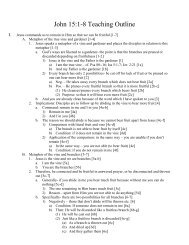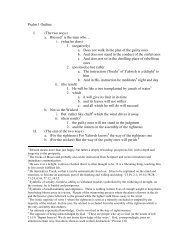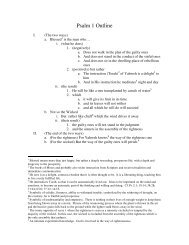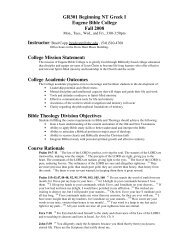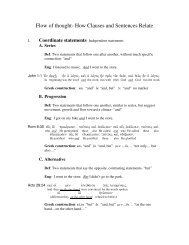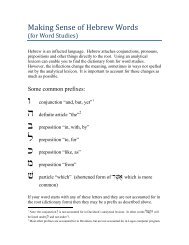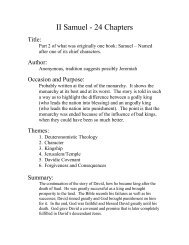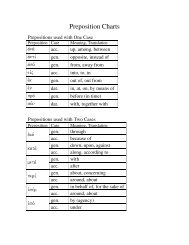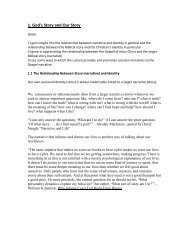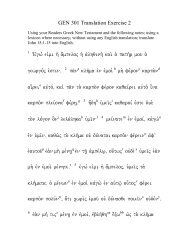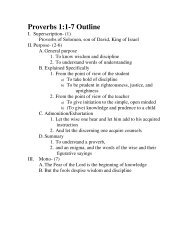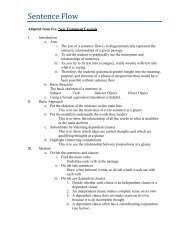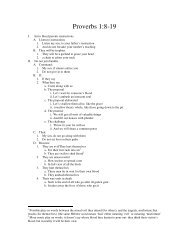Course Syllabus - Bradcopp.com
Course Syllabus - Bradcopp.com
Course Syllabus - Bradcopp.com
Create successful ePaper yourself
Turn your PDF publications into a flip-book with our unique Google optimized e-Paper software.
GEN401 Hebrew<br />
Pacific Life Bible College<br />
Fall 2012<br />
Thurs. 8:00-11:20am<br />
Instructor: Brad Copp, bcopp@pacificlife.edu , (604) 868-1162<br />
Office hours in the PLBC Office Building.<br />
College Mission Statement:<br />
At Pacific Life Bible College, our purpose is to equip Christian men and women "for the<br />
work of service, to the building up of the body of Christ" (Ephesians 4:11). We assist your<br />
local church in fulfilling the Great Commission by helping develop the character, knowledge,<br />
and skills you need to reach your world for Jesus.<br />
Character Development<br />
Your character development is encouraged through courses that emphasize personal<br />
integrity, dynamic classroom and chapel experiences, an on-going mentoring<br />
program, and a <strong>com</strong>munity of supportive faculty, friends, and fellow students. We<br />
consider character qualities to be the main criteria for assessing leadership potential<br />
(1 Timothy 3).<br />
Academic Excellence<br />
On the foundation of godly character, we add knowledge: systematic instruction from<br />
God's Word, applied to a changing world. Leaders that make an eternal difference in<br />
their world have a thoroughly Christian worldview, understanding people and current<br />
events from the timeless perspective of Scripture.<br />
Ministry Experience<br />
While we strive to instill in you a sense of academic excellence, we don't end the<br />
process there. Hearers of the Word are to also be doers of the Word. We help you<br />
apply learning to practical service to others through connecting to local church<br />
leadership for guided hands-on practicums and internship programs. Our goal is to<br />
help you be<strong>com</strong>e a leader, firmly founded on sound doctrine and reaching out in the<br />
effective power of the Spirit.<br />
<strong>Course</strong> Rationale<br />
Psalm 19:7-11<br />
7 The law of the LORD is perfect, reviving the soul. The statutes of the LORD are trustworthy,<br />
making wise the simple. 8 The precepts of the LORD are right, giving joy to the heart. The <strong>com</strong>mands of the<br />
LORD are radiant, giving light to the eyes. 9 The fear of the LORD is pure, enduring forever. The ordinances of<br />
the LORD are sure and altogether righteous. 10 They are more precious than gold, than much pure gold; they<br />
are sweeter than honey, than honey from the <strong>com</strong>b. 11 By them is your servant warned; in keeping them there is<br />
great reward.<br />
Psalm 119:43,47,48-48, 92, 95, 97-99, 103, 105, 160 43 Do not snatch the word of truth from my mouth, for I<br />
have put my hope in your laws… 47 for I delight in your <strong>com</strong>mands because I love them. 48 I lift up my hands to<br />
your <strong>com</strong>mands, which I love, and I meditate on your decrees… 92 If your law had not been my delight, I would<br />
have perished in my affliction... 95 The wicked are waiting to destroy me, but I will ponder your statutes… 97 Oh,<br />
how I love your law! I meditate on it all day long. 98 Your <strong>com</strong>mands make me wiser than my enemies, for they<br />
are ever with me. 99 I have more insight than all my teachers, for I meditate on your statutes… 103 How sweet<br />
are your words to my taste, sweeter than honey to my mouth!… 105 Your word is a lamp to my feet and a light<br />
for my path… 160 All your words are true; all your righteous laws are eternal.<br />
Ezra 7:10<br />
10 For Ezra had devoted himself to the study and observance of the Law of the LORD, and to<br />
teaching its decrees and laws in Israel. See Neh. Ch. 8
John 5:39<br />
39 You diligently study the Scriptures because you think that by them you possess eternal life.<br />
These are the Scriptures that testify about me,<br />
1 Timothy 4:13-16 13 Until I <strong>com</strong>e, devote yourself to the public reading of Scripture, to preaching and to<br />
teaching. 14 Do not neglect your gift, which was given you through a prophetic message when the body of<br />
elders laid their hands on you. 15 Be diligent in these matters; give yourself wholly to them, so that everyone<br />
may see your progress. 16 Watch your life and doctrine closely. Persevere in them, because if you do, you will<br />
save both yourself and your hearers.<br />
2 Timothy 2:15 15 Do your best to present yourself to God as one approved, a workman who does not need to<br />
be ashamed and who correctly handles the word of truth.<br />
"Pastors who do not know Greek are forced to borrow their ideas from others. They are slaves to the<br />
<strong>com</strong>mentators, but have no means to check their accuracy. The best tools of interpretation are beyond their<br />
reach." -David Black<br />
"The more a theologian detaches himself from the basic Hebrew and Greek text of Holy Scripture, the more he<br />
detaches himself from the source of real theology? And real theology is the foundation of a fruitful and blessed<br />
ministry." -Heinrich Bitzer,<br />
"Reading the Bible in translation is like kissing your new bride through a veil." Haim Machman Bialik<br />
"If the languages had not made me positive as to the true meaning of the word, I might have still remained a<br />
chained monk, engaged in quietly preaching Romish errors in the obscurity of a cloister; the pope, the sophists,<br />
and their anti-Christian empire would have remained unshaken." -Martin Luther<br />
"Without languages we could not have received the Gospel. Languages are the scabbard that contains the<br />
sword of the Spirit; they are the casket which contains the priceless jewels of antique thought; they are the<br />
vessel that holds the wine; and as the gospel says, they are the baskets in which the loaves and fishes are kept to<br />
feed the multitude. If we neglect the literature we shall eventually lose the gospel….No sooner did men cease<br />
to cultivate the languages than Christendom declined, even until it fell under the undisputed dominion of the<br />
pope. But no sooner was this torch relighted, than this papal owl fled with a shriek into congenial gloom….In<br />
former times the fathers were frequently mistaken, because they were ignorant of the languages and in our days<br />
there are some who, like the Waldenses, do not think the languages of any use; but although their doctrine is<br />
good, they have often erred in the real meaning of the sacred text; they are without arms against error, and I<br />
fear much that their faith will not remain pure." – Martin Luther<br />
"As dear as the gospel is to us all, let us as hard contend with its language." Martin Luther<br />
"A guide to souls ought to know the literal meaning of every word, verse, and chapter in Scripture, without<br />
which there can be no firm foundation on which the spiritual meaning can be built...Can he do this in the most<br />
effectual manner, without a knowledge of the original languages? Without this will he not frequently be at a<br />
stand, even as to texts which regard practice only? But will he be still under greater difficulties with respect to<br />
converted Scriptures. He will not be able to rescue these out of the hands of any man of learning that would<br />
pervert them: for whenever an appeal is made to the original [language], his mouth is stopped at once." -John<br />
Wesley<br />
“Once John Wesley received a note from a self-appointed evangelist telling him, „The Lord has told me to tell<br />
you that He doesn't need your book learning, your Greek and Hebrew.‟ Wesley replied, „Thank you, Sir. Your<br />
letter was superfluous, however, as I already knew the Lord has no need of my 'book learning' as you put it.<br />
However, although the Lord has not directed me to say so, on my own responsibility I would like to say, the<br />
Lord does not need your ignorance either.‟" - source unknown<br />
“It should go without saying that if a professor in biblical studies is unable to deal with technical linguistic<br />
arguments in a class because most of the students have not taken Greek and Hebrew, the level of instruction<br />
necessarily drops. Moreover, the important education that takes place as students converse with one another<br />
also plummets several notches. The natural tendency to gravitate toward „relevancy‟ and pragmatism can do<br />
nothing but flourish in such an environment. And the end result is an increase in the poisonous antiintellectualism<br />
that has already taken its toll in the evangelical church.” - Moises Silva
<strong>Course</strong> Description:<br />
The student is introduced to the basic features of Old Testament Hebrew, including grammar, vocabulary, and<br />
oral reading. The result is the ability to read the simpler portions of the Old Testament with the aid of a Hebrew<br />
Lexicon. Prerequisite: GEN201<br />
<strong>Course</strong> Objectives:<br />
Upon <strong>com</strong>pleting this course, the student should be able to:<br />
1. Develop a working knowledge of Hebrew morphology, grammar, and basic syntax.<br />
2. Define over 100 Hebrew vocabulary words.<br />
3. Understand and recognize Hebrew nouns and nominals.<br />
4. Understand and recognize some of the Hebrew verbal forms.<br />
5. Have been exposed to the derived verbal stems.<br />
6. Translate selected Hebrew sentences.<br />
7. Better understand English grammar and read English Bible translations with more skill.<br />
8. Have gained an appreciation for how knowledge of the Hebrew language can be a valuable help to<br />
Bible study.<br />
9. Apply insights gained from study of the OT in Hebrew to life and ministry.<br />
Textbooks and Suggested Readings:<br />
Textbooks<br />
Brown, A. Philip II and Bryan Smith eds., A Reader‟s Hebrew Bible, Grand Rapids, Zondervan, 2008.<br />
Pratico, Gary D. and Miles V. Van Pelt, Basics of Biblical Hebrew – Grammar , 2 nd ed., Grand Rapids,<br />
Zondervan, 2007.<br />
-----, Basics of Biblical Hebrew – Workbook, 2 nd ed., Grand Rapids, Zondervan, 2007.<br />
Suggested Readings<br />
Arnold, Bill T., and John H. Choi, A Guide to Biblical Hebrew Syntax, Cambridge, Cambridge University<br />
Press, 2003.<br />
Brown, Francis, S. R. Driver, and Charles A Briggs, The New Brown – Driver – Briggs – Gesenius Hebrew<br />
and English Lexicon, Peabody MA, Hendrickson, 1979.<br />
Chisholm, Robert B. Jr., From Exegesis to Exposition – A Practical Guide to Using Biblical Hebrew,<br />
Grand Rapids, Baker, 1988.<br />
Fields, Lee M., Hebrew for the Rest of Us, Grand Rapids, Zondervan, 2008<br />
Holladay, William L., A Concise Hebrew and Aramaic Lexicon of the Old Testament, Grand Rapids,<br />
Eerdmans, 1988.<br />
Sizler, Peter James, and Thomas Findley, How Biblical Languages Work, Grand Rapids, Kregel, 2004.<br />
Williams, Ronald J., Hebrew Syntax – An Outline, 2 nd ed., Toronto, University of Toronto Press, 2001.
<strong>Course</strong> Requirements: (see calendar for due dates)<br />
1. Class Participation- Student is to be present, and to participate in all classroom discussion<br />
and activities<br />
2. Textbook Reading- Student is to read the assigned sections of the course Textbook before<br />
the assigned class session.<br />
3. Workbook Exercises- Student is to <strong>com</strong>plete the assigned workbook exercises before the<br />
assigned class session.<br />
4. Vocabulary/Grammar Cards- Student is to hand make flash cards for all the vocabulary<br />
words and grammar paradigms covered before the Midterm (Oct. 25) . The purpose for this<br />
assignment is to take advantage of the learning/memorization benefit of connecting eye and<br />
brain with your hand. Therefore, using <strong>com</strong>mercially purchased or <strong>com</strong>puter generated flash<br />
cards will not fulfill this assignment. Due Nov. 15 th .<br />
5. Vocabulary Quizzes- Student will take regular quizzes in which they will translate assigned<br />
Hebrew words into English.<br />
6. Grammar/Translation Quizzes- Student will take regular grammar/translation quizzes in<br />
which they will recognize, describe, parse/and or translate various aspects of Old Testament<br />
Hebrew.<br />
7. Translation Exercises- Student will put their Hebrew knowledge into practice by translating<br />
short sections of Hebrew text into English.<br />
8. Sectional Exams- There will be two sectional exams which will cover all of the material up<br />
to that point in the term (material covered in the first exam will be fair game for the second).<br />
The exams will cover vocabulary, grammar/parsing, and translation.<br />
<strong>Course</strong> Evaluation<br />
Workbook Exercises 15%<br />
Vocabulary/Grammar Flashcards 5%<br />
Vocabulary Quizzes 15%<br />
Grammar/Translation Quizzes 15%<br />
Translation Exercises 10%<br />
Sectional Exams 20% ea. 40%<br />
100%
<strong>Course</strong> Schedule<br />
Date<br />
Wk. 1<br />
Sept. 13<br />
Wk. 2<br />
Sept. 20<br />
Wk. 3<br />
Sept. 27<br />
Wk. 4<br />
Oct. 4<br />
Wk. 5<br />
Oct. 11<br />
Wk. 6<br />
Oct. 18<br />
Wk. 7<br />
Oct. 25<br />
Wk. 8<br />
Nov. 1<br />
Wk. 10<br />
Nov. 8<br />
Wk. 11<br />
Nov. 15<br />
Wk. 12<br />
Nov. 22<br />
Wk. 13<br />
Nov. 29<br />
Wk. 14<br />
Dec. 6<br />
Assignments<br />
Due<br />
Block 1 Block 2 Block 3<br />
None Review Chs. 1-3 BBH ch. 4 BBH ch. 5<br />
VQ3-4 1<br />
WB4-5 2<br />
VQ5-6<br />
WB6-7<br />
VQ7-8<br />
WB8<br />
Grammar Quiz<br />
VQ9-10<br />
WB9-10<br />
VQ11-12<br />
WB11-12<br />
VQ13<br />
WB13<br />
VQ14<br />
WB14<br />
Translation 1<br />
Flashcards<br />
VQ15<br />
WB15<br />
VQ16<br />
WB16<br />
VQ17-18<br />
WB17-18<br />
Grammar Quiz<br />
VQ19<br />
WB19<br />
Workbook Review<br />
and Quiz<br />
Workbook Review<br />
and Quiz<br />
Workbook Review<br />
and Quiz<br />
Workbook Review<br />
and Quizzes<br />
BBH ch. 6 BBH ch. 7<br />
BBH ch. 8 BBH ch. 9<br />
BBH ch. 10 BBH ch. 11<br />
BBH ch. 12 BBH ch. 12<br />
Workbook Review<br />
and Quiz<br />
BBH ch. 13 BBH ch. 13<br />
Workbook Review BBH ch. 14 BBH ch. 14<br />
and Quiz<br />
Sectional Exam<br />
Workbook Review BBH ch. 15<br />
and Quiz<br />
Reading Break<br />
NO CLASS<br />
Workbook Review BBH ch. 16 BBH ch. 16<br />
and Quiz<br />
Workbook Review<br />
and Quiz<br />
Workbook Review<br />
and Quiz<br />
Workbook Review<br />
and Quizzes<br />
Final Exam – Dec. 13 th 8:00-10:00am<br />
BBH ch. 17 BBH ch. 18<br />
BBH ch. 19 BBH ch. 19<br />
BBH ch. 20-21 BBH ch. 22-23<br />
1 Vocabulary Quiz on words up to chapters 3 and 4 of BBH.<br />
2 Workbook pages for BBH chapters 4 and 5.
Bibliography<br />
$ = excellent, best in category<br />
Hebrew Texts<br />
1. $[BHS] Biblia Hebraica Stuttgartensia, ed., Alt, Eisfeldt, Kahle and Kittel, Stuttgart, Deutsche<br />
Bibelgesellschaft, 1967.<br />
2. [BHK],Biblia Hebraica ed., Rudolph Kittel, Stuttgart, Deutsche Biblegesellschaft, 1937.<br />
3. Sepher Torah Nabiim veKethubim (Hebrew Old Testament), Norman Snaith ed., British and Foreign Bible<br />
Society, n.d. REF 221.48 SNAI<br />
4. Scott, William R., A Simplified Guide to BHS, Bibal Press, 1987. [Explains all the Masoretic markings<br />
including Masoretic footnotes, Textual apparatus and accents]<br />
Interlinears<br />
1. Green, Jay P. Sr., Pocket Interlinear Old Testament, Grand Rapids, Baker Book House, 1988. REF 220.44<br />
GREE<br />
2. Kohlenberger, John R. III (Editor), Interlinear NIV Hebrew-English Old Testament, Grand Rapids, Zondervan,<br />
1993.<br />
Concordances<br />
1. $The Strongest NASB Exhaustive Concordance, Grand Rapids, Zondervan, 2000. [NASB coded to Hebrew<br />
dictionary in back] REF 220.5208 STRO<br />
2. $The Strongest NIV Exhaustive Concordance, Grand Rapids, Zondervan, 1999. [NIV coded to Hebrew<br />
dictionary in back] REF 220.520813 GOOD<br />
3. $Wigram, George V., The Englishman‟s Hebrew and Chaldee Concordance of the Old Testament, Nashville,<br />
Broadman Press, 1980. [Hebrew Entries, English translations of passages.] REF 492.43 WIGR<br />
4. Young, Robert, Young‟s Analytical Concordance to the Bible, Grand Rapids, Eerdmans. REF 220.52<br />
YOUN<br />
5. The New American Standard Exhaustive Concordance of the Bible, The Lockman Foundation. 1981. [similar<br />
to Strong‟s with NASB text] REF 220.52 NEWA<br />
Lexicons<br />
1. $Brown, Driver, Briggs, and Gesenius, The New Brown-Driver-Briggs-Gesenius Hebrew and English Lexicon,<br />
Peabody MA, Hendrickson, 1979. [An updating of Gesenius, though now somewhat out of date itself] REF<br />
492.43 BROW<br />
2. Gesenius, William, Gesenius‟ Hebrew and Chaldee Lexicon, Grand Rapids, Eerdmans, 1949. 492.43 GESE<br />
3. $Koehler, Baumgartner, The Hebrew and Aramaic Lexicon of the Old Testament (Unabridged 2-Volume Study<br />
Edition), Brill Academic Publishers, 2002. REF 221.4403 Kohl<br />
4. $Einspahr, Bruce, Index to Brown, Driver and Briggs Hebrew Lexicon, Moody Press, 1976.<br />
5. $Holladay, William L., A Concise Hebrew and Aramaic Lexicon of the Old Testament, Grand Rapids,<br />
Eerdmans, 1988. [An abridgement of Koehler-Baumgartner] REF 221.4403 CONC<br />
6. Robinson, Maurice A, Indexes to all Editions of Brown-Driver-Briggs Hebrew Lexicon,.LaFayette IN,<br />
Sovereign Grace Publishers, 2001. REF 492.43<br />
7. Armstrong, Busby, Carr, A Reader‟s Hebrew-English Lexicon of the Old Testament, Grand Rapids, Regency,<br />
1989. REF 221.4403 ARMS<br />
Parsing Guides and Analytical Lexicons<br />
1. $Beall,Todd S. and William A. Banks, Colin S. Smith, Old Testament Parsing Guide: Revised and Updated<br />
Edition, Broadman & Holman, 2000. REF 492.45 BEAL<br />
2. $Davidson, Benjamin, Analytical Hebrew and Chaldee Lexicon, Peabody, MA, Hendrickson, 1981. REF<br />
492.4321 DAVI<br />
Vocabulary Aids and Lists<br />
1. Mitchel, Larry A., A Student's Vocabulary for Biblical Hebrew and Aramaic, Grand Rapids, Zondervan, n.d.<br />
2. Biblical Hebrew Vocabulary Cards, Springfield OH, Visual Education.
Word Studies and Exegetical Dictionaries<br />
1. Richardson, Alan ed., A Theological Wordbook of the Bible, New York, MacMillan, 1950. [not exhaustive, but<br />
very helpful on the words covered]<br />
2. Vine, W.E., An Expository Dictionary of New Testament Words, Nashville, Thomas Nelson, 1985. [Some<br />
editions of Vine's include a section on Old Testament Words] REF 220.3 VINE<br />
3. Wilson, William, Wilson's Old Testament Word Studies, McLean VA MacDonald Publishing [listed according<br />
to English Words, with some helpful information] REF 221.1 WILS<br />
4. $Harris, Archer and Waltke, Theological Wordbook of the Old Testament 2 Vols., Chicago, Moody Press,<br />
1980. [listed by number, cross-referenced to Strong's numbers in index] REF 221.440321 THEO<br />
5. $Girdlestone, Robert Baker, Girdlestones Synonyms of the Old Testament, Grand Rapids, Baker, 1983.<br />
[discussion of certain Hebrew words by <strong>com</strong>paring and contrasting with synonyms, Hebrew words listed in<br />
index]<br />
6. Pick, Aaron, Dictionary of Old Testament Words for English Readers, Grand Rapids, Kregel, 1997.<br />
7. $VanGemeren, Willem A. general ed., New International Dictionary of Old Testament Theology and Exegesis,<br />
Grand Rapids, Zondervan, 1997. [Similar to Kittel and Colin Brown discussing Old Testament words in<br />
considerable depth] REF 221.3 VANG<br />
8. TDNT and Colin Brown [often these New Testament wordbooks have discussions on Old Testament words<br />
which can be helpful]<br />
Word Study Commentaries<br />
1. Keil and Delitzsch Commentary series. (K-D)<br />
2. Word Biblical Commentaries (WBC)<br />
3. International Critical Commentaries (ICC)<br />
4. New International Commentaries of the Old Testament (NICOT)<br />
Beginning Grammars<br />
1. $Fields, Lee M., Hebrew for the Rest of Us, Grand Rapids, Zondervan, 2008. 492.482 FIEL<br />
2. $LaSor, William Sanford, Handbook of Biblical Hebrew, Grand Rapids, Eerdmans, 1978.<br />
3. Kelley, Page H., Biblical Hebrew, An Introductory Grammar, Grand Rapids, Eerdmans, 1992.<br />
4. Mansoor, Menahem, Biblical Hebrew Step by Step, Grand Rapids, Baker Book House, 1957. 492.482 MANS<br />
5. $Seow, C.L., A Grammar for Biblical Hebrew, Nashville, Abingdon, 1995. 492.4824 SEOW<br />
6. Weingreen, J., A Practical Grammar for Classical Hebrew, Oxford, Clarendon, 1959.<br />
7. Harper, William R., Elements of Hebrew, New York, Charles Scribner‟s Sons, 1899.<br />
8. The Hebrew Students‟ Manual, New York, Harper and Brothers, n.d.<br />
9. Davidson, A.B., A Introductory Hebrew Grammar, Edinburgh, T&T Clark, 1874. REF 492.45<br />
DAVI<br />
Intermediate Grammars<br />
1. Kautzsch, E., Gesenius‟ Hebrew Grammar, Oxford, Clarendon, 1910.<br />
2. $Chisholm, Robert B. Jr., From Exegesis to Exposition, Grand Rapids, Baker Books, 1998.<br />
3. $Williams, Ronald J. Hebrew Syntax-An Outline, Toronto, University of Toronto Press, 1967.<br />
4. Ben Zvi, Hancock, Beinert, Readings in Biblical Hebrew, New Haven, Yale University Press, 1993.<br />
Advanced and Reference Grammars<br />
1. $Waltke and O‟Connor, An Introduction to Biblical Hebrew Syntax, Winona Lake IN, Eisenbrauns, 1990.<br />
2. Driver, S.R., A Treatise on the Use of the Tenses in Hebrew and Some Other Syntactical Questions, Grand<br />
Rapids, Eerdmans, 1874.<br />
Computer Programs<br />
For PC<br />
1. $Bibleworks- Hermeneutika Bible Research Software, Big Fork Montana- see website below<br />
2. Logos Bible Software- Logos Research Systems, Oak Harbor, WA- see website below<br />
3. PC Study Bible- see website below<br />
For Mac<br />
1. Accordance Bible Software
Web sites<br />
1. http://www.galaxie.<strong>com</strong>/html/shareware.htm – Shareware Greek and Hebrew Fonts<br />
2. $http://www.bibleworks.<strong>com</strong> – One of the best Bible softward packages available<br />
3. http://www.gramcord.org/ - Store for an excellent Bible software as well as Greek and Hebrew learning tools.<br />
4. http://www.logos.<strong>com</strong> – Bible software (not the best, ask me why)<br />
5. http://www.biblesoft.<strong>com</strong> – PC Study Bible Software<br />
6. http://www.quickverse.<strong>com</strong> – Quickverse Bible Software<br />
7. See the course website for more helpful links<br />
Hebrew Poetics<br />
1. Alter, Robert, The Art of Biblical Poetry, New York, Basic Books, 1985.<br />
2. Berlin, Adele, “Introduction to Hebrew Poetry,” In The New Interpreter‟s Bible, vol. 4 pp. 301-315. Nashville,<br />
Abingdon, 1996.<br />
3. Fee, Gordon, and Douglas Stuart, How to Read the Bible for all Its Worth, pp. 180,189-191, 211, Grand Rapids,<br />
Zondervan, 1993.<br />
4. Fokkelman, J.P. Reading Biblical Poetry: An Introductory Guide, Louisville, Westminster John Knox, 2001.<br />
5. Klein, William W., Craig L. Blomberg, and Robert L. Hubbard Jr., Introduction to Biblical Interpretation,<br />
chapter 7 pp. 215-255, Dallas, Word, 1993.<br />
6. LaSor, William Sanford, David Allan Hubbard, and Frederic William Bush, Old Testament Survey, ch. 23<br />
“Hebrew Poetry” pp. 307-318.<br />
7. Ridderbos, N.H., and H.M. Wolf, “Poetry, Hebrew” In The International Standard Bible Encylclopedia, vol. 3<br />
pp. 891-898.<br />
OT Interpretation and Criticism<br />
1. Alter, Robert, The Art of Biblical Narrative, New York, Basic Books, 1981.<br />
2. Armerding, Carl E., The Old Testament and Criticism, Grand Rapids, Eerdmans, 1983.<br />
3. Broyles, Craig C. ed., Interpreting the Old Testament, Grand Rapids, Baker Academic, 2001.<br />
4. Linnemann, Eta, Historical Criticism of the Bible, Methodology or Ideology? Grand Rapids, Baker, 1990.<br />
5. Long, V.Philips, The Art of Biblical History, Grand Rapids, Zondervan, 1994.
PLBC Absence Policy:<br />
Students are expected to be present, prepared and on time for all classes. Instructors will mark<br />
attendance for each class. Unexcused absences and tardiness may result in lowering the final grade.<br />
Total absences in excess of 25% of classes may result in the student being asked to withdraw from the<br />
class with a fail. Students are expected to schedule all other appointments after class hours. If at any<br />
time during the semester, you are absent or late for a class, you are required to check with the<br />
instructor before the next class period to see what assignments and/or tests you may have missed, as<br />
you are responsible for all assignments.<br />
PLBC Academic Freedom Statement<br />
PLBC Faculty and students are granted academic freedom within the context of submission to God‟s<br />
revealed truth. The Scripture is the final and primary functional authority on all questions of truth,<br />
value and practice. Instructors should model a passionate pursuit of truth wherever it leads, fairly<br />
present all major sides of controversial issues, demonstrate academic integrity in evaluating diverse<br />
truth claims, extend gracious, loving respect toward those who disagree, and exemplify courageous<br />
faithfulness in holding to those truths that are Biblically justified. Instructors need to demonstrate<br />
unity in essentials, liberty in non-essentials and charity in all things. Students should follow and<br />
embrace the Biblical ideal of passion for truth in a context of intellectual freedom under humble<br />
submission to God and love for one another.<br />
PLBC <strong>Course</strong> Extension Policy<br />
Instructors are able to grant students an informal extension of one week after the PLBC assignment<br />
deadline date. If more time is required, the student must apply and pay for the formal extension<br />
(maximum extension of one month from the assignment deadline date). The formal request for an<br />
extension must be made before the end of the semester. Valid reasons for extensions consist of issues<br />
such as a death in the family, a family emergency, personal illness, chronic health issue, or a learning<br />
disability. The instructor has the right to deny any extension request. When an extension is approved<br />
the final course grade will be set to “I” (In<strong>com</strong>plete) and after the one month extension has expired, a<br />
grade is assigned to the student based on the course work received to date. A fee of $15 per credit<br />
hour is charged for course extensions.
Class Policies<br />
In order to be fair to all students, to organize my workweek, and to be prompt with marking, the following<br />
policies will be adhered to. It is also an important aspect of preparation for life after PLBC that students<br />
should learn to plan and use their time effectively so as to meet deadlines, and learn also to work within<br />
the parameters set for assignments.<br />
All assignments must be submitted at the beginning of class on the date they are due. If class will be<br />
missed because of illness, assignments may be submitted via e-mail, Populi or PLBC office before<br />
scheduled class time. Any assignment not submitted at the requested time will be considered late.<br />
<br />
<br />
<br />
<br />
<br />
<br />
<br />
Late work will receive a deduction of 10% per day late (excluding weekends) up to 50% deduction.<br />
You may submit a late assignment either in class, via e-mail, via Populi or via the PLBC office.<br />
Extensions for late work may be given for a short period when circumstances arise which in my view<br />
could not reasonably have been foreseen and which are sufficiently serious to warrant an exception to<br />
the rule.<br />
All work must be neat and legible.<br />
All assignments must be your own work. Work sharing and plagiarism are not acceptable.<br />
Because of the limited number of language and exegesis tools in the library, I ask that you be<br />
considerate of others and not monopolize the resources. I would also ask that dorm students give<br />
priority to off campus students or those with more limited schedules.<br />
Because of the uneven quality of the information, Wikipedia and other similar information sharing<br />
resources are not acceptable reference for this class.<br />
I expect all students to think critically and be willing to disagree with the texts, teacher, or each other.<br />
I am confident that all of you will do so in manner fitting Bible College students and ministers of the<br />
Gospel of Jesus Christ.<br />
Helpful Information<br />
<br />
<br />
<br />
<br />
<br />
<br />
Your best resource for this course is the people around you. The instructor is willing and available to<br />
help you as much as my very busy schedule will allow. However, your peers are also an invaluable<br />
source of insight. And you will be wise to share with other students outside of class and help each<br />
other explore and develop, meditate upon and apply the concepts of this course.<br />
I cannot read minds. If you don‟t understand something or are struggling, I want to help. But in<br />
many cases I won‟t be<strong>com</strong>e aware of the problem until it is too late. Please feel free to take the<br />
initiative and approach me with questions or problems and I will do my best to help.<br />
<strong>Course</strong> Stuff will be posted on Populi and the course website. If you go to my profile (search on<br />
„Brad Copp‟) and go to “Bulletin Board” and click “Follow Brad”, then any updates I post for this<br />
class will automatically be posted to your home page on Populi. Please check back often because the<br />
class section will be regularly updated.<br />
In addition, I will put course material including study guides, reviews, and practice quizzes on my<br />
website. Go to my homepage and follow the appropriate link. The address is www.bradcopp.<strong>com</strong>.<br />
Please check back often as the website will be updated on a regular basis.<br />
Please realize that, at best, this course can only be an introduction to Hebrew. It is hoped that this<br />
course will give you a foundation upon which to launch a lifetime of study, devotion, teaching and<br />
preaching. Be encouraged to continue in your language study even after the course.<br />
Finally, do not lose God in the process of education. Take advantage of the College Student Ministry<br />
and Discipleship. Take time to interact with Jesus about every part of your life. Specifically, invite<br />
the Lord to teach and lead you in the course material. The Bible was written out of lives of prayer,<br />
worship, devotion and wisdom‟s wrestling with life and the Mighty Acts of God. It would be a<br />
tragedy and violation of these books if you treated this course as only an intellectual exercise. I also<br />
hope that you learn to rely on Him for the strength to learn and grow and fulfill all of the expectations<br />
placed on you at PLBC. “Do not pray for easy lives; pray to be stronger people! Do not pray for<br />
tasks equal to your powers; pray for powers equal to your tasks. Then the doing of your work shall be<br />
no miracle, but you shall be a miracle. Every day you shall wonder at yourself, at the richness of life<br />
which has <strong>com</strong>e to you by the grace of God.” Phillips Brooks.



